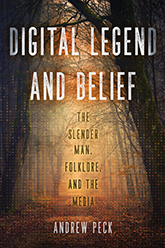|
Digital Legend and Belief
The Slender Man, Folklore, and the Media
Andrew Peck
Winner, Chicago Folklore Prize, American Folklore Society
“A seminal work of digital scholarship that offers original insight, fantastic fieldwork, and meticulous explanation of a complex and challenging subject; written clearly, engagingly, and with authority.”
—Elizabeth Tucker, Binghamton University
What happens when legends go online?
The internet brings new urgency to the study of folklore. The digital networks we use every day amplify the capacity of legends to spread swiftly, define threats, and inform action. Using the case of a particularly popular digital bogeyman known as the Slender Man, Andrew Peck brings the study of legends into the twenty-first century. Peck explains not only how legends circulate in the digital swirl of the internet but also how the internet affects how legends seep into our offline lives and into the mass media we consume. What happens, he asks, when legends go online? How does the internet enable the creation of new legends? How do these ideas go viral? How do tradition and technology interact to construct collaborative beliefs?
Peck argues that the story of the Slender Man is really a story about the changing nature of belief in the age of the internet. Widely adopted digital technologies, from smartphones to social media, offer vast potential for extending traditional and expressive social behaviors in new ways. As such, understanding the online landscape of contemporary folklore is crucial for grasping the formation and circulation of belief in the digital age. Ultimately, Peck argues that advancing our comprehension of legends online can help us better understand how similar belief genres—like fake news, conspiracy theories, hoaxes, rumors, meme culture, and anti-expert movements—are enabled by digital media.
 Andrew Peck, an assistant professor of strategic communication at Miami University, is the coeditor of Folklore and Social Media. He has published many articles and chapters on the folkloric figure known as the Slender Man, digital legends, internet memes, and fake news.
Andrew Peck, an assistant professor of strategic communication at Miami University, is the coeditor of Folklore and Social Media. He has published many articles and chapters on the folkloric figure known as the Slender Man, digital legends, internet memes, and fake news.
Praise
“Peck’s analysis of the Slender Man legend stalks the sinister figure through all his manifestations, from playful creation to a motive for murder. Digital Legend and Belief demonstrates that folklore is a vital force in virtual culture, and it is a revolutionary model for future discussions of internet-mediated traditions.”
—Bill Ellis, Penn State University
“A timely and knowledgeable contribution. . . . An extraordinary, ground-breaking and seminal study that will be of particular interest to students of folklore/mythology and communications/media studies. Exceptionally well written, organized and presented.”
—Midwest Book Review
“Peck’s research, storytelling, and intelligent writing style make this an excellent exploration of how stories spread through digital channels affect culture and beliefs both on and offline. . . . Highly recommended.”
—CHOICE Reviews
Table of Contents
CONTENTS
Acknowledgments
List of Illustrations
Introduction: Folklore for the Digital Age
1 Creation
2 Circulation
3 Commercialization
4 Ostension
5 Sensation
Conclusion: Lessons from the Slender Man
Appendix
Notes
References
Index
Of Related Interest
|

The Last Laugh
Folk Humor, Celebrity Culture, and Mass-Mediated Disasters in the Digital Age
Trevor J. Blank |

The Paradox of Authenticity
Folklore Performance in Post-Communist Slovakia
Joseph Grim Feinberg |
|

Larger images
July 2023
266 pp. 6 x 9
6 b/w illus.
|

